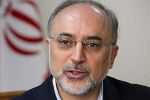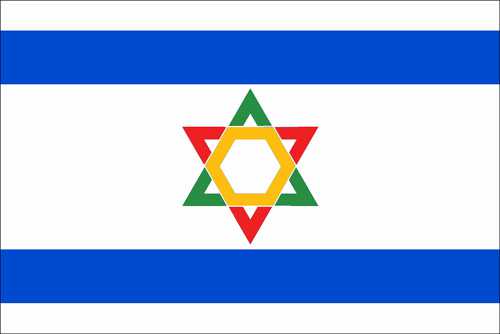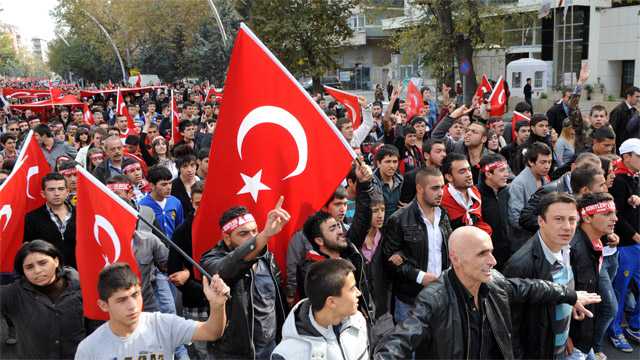Turkish premier’s call for secularism in Arab Spring countries has raised Turkey’s stature as a model for democracy, Paul Salem tells the Daily News
Turkish Prime Minister Recep Tayyip Erdoğan’s call for secularism has calmed the fears of those concerned Turkey was about to create a network of Muslim Brotherhood-led governments to control the Arab world, said a regional expert. His statement also relieved the secularists who feared the Islamists, said Paul Salem, the director of Carnegie Middle East Center. Turkey stands as the most attractive model, since other models like Iran have failed, Salem told the Daily News in a recent interview in Beirut.
Q: Where are we with the Arab Spring?
A: It is a changed Arab world. Peoples’ mentalities have changed. Even if conditions in certain countries have not changed, people have changed. This change has gone in the direction of people prioritizing democracy and pluralism. This was clearly a pro-democracy revolution.
Now we are entering a new era. We had the era where political Islam in a non-democratic, often violent, format was the proposed solution. This is the era where democratization is the key. Political Islam is coming under the context and conditions of democracy. And obviously the Turkish example of a party with Islamic roots successful in a democratic state is the most attractive model for the states that have been through a revolution.
Today the majority of Arab citizens by number are either living in countries transitioning to democracy like Egypt, Tunisia, Libya or semi-democracies like Iraq or Lebanon or in countries in revolutions asking for democracy like Syria or Yemen. This is significant. But the process is filled with uncertainties, risks and challenges.
Q: How about the impact on international and regional balances?
A: It did not so far have a major impact on regional or international balance of power. This could change if the uprising in Syria reaches its end point with a regime change. If Syria changes its leadership this will mean the new regime will probably not have the same deep relations with Iran or Hezbollah. And it might lose access to Hamas and the Palestinian issue. This will be a major loss for Iran. It will retreat and focus more on Iraq and Afghanistan.
The U.S. has lost in the Arab Spring, but it has lost much less than it thought. The relationship with Egypt like the one with Turkey will be more challenging.
Turkey is one of the slight winners. The revolutionaries did not say we want to be like Iran or Saudi Arabia or America. Most of them were saying we want to be something like Turkey.
And these revolutions are pro-globalization and pro-business. That is good for Turkey. Egypt wants trade and economic progress. The Muslim Brotherhood and Islamist forces, which are likely to be important players, are looking to the Justice and Development Party (AKP) to see if they can learn anything. Now they realize being in the opposition is easier than being in the government. Arab Spring was about poverty and lack of economic progress.
The Muslim Brotherhood is realizing that if they cannot get jobs and the economy going, people will not like them either. And they are aware of that. They look to Turkey for advice. It is not a model. But they know that they have more to learn from Turkey than from Saudi Arabia or Iran.
Q: For “political Islam” to function under democracy, isn’t there a need to reconcile with secularism? Turkish Prime Minister Recep Tayyip Erdoğan’s call for secularism was not welcomed by all.
A: Secularism has failed as a word and as a strong philosophy to build legitimacy in the Arab world. But what is meant by secularism has legitimacy in the wider Arab world.
Many parties and citizens participating in the Arab uprising actually believe in the details of secularism. Islamists won the argument that if you say you are secularist it means you are atheist. But Islamic slogans were hardly visible during uprisings even though Islamists were there. They agreed on the words “civil state”; they are the new buzz words.
This is where they disagree with Erdoğan: While accepting the civil state, the Islamist say “since we are mostly Muslim, we should include in the constitution a reference to Islam and sharia,” but they don’t say “we want to be an Islamic state.”
Q: So will the Islamist parties be the dominant players in the region?
A: They will do quite well in the elections. They will be the biggest single blocs, but not majority blocs. This partly reflects the strategy of Islamists. They are aware that they are feared.
Their strategy is to move gradually and to enter coalitions.
Q: There are fears that like in the Iranian example, the Islamists will soon get rid of their coalition partners and impose a less tolerant rule.
A: The risk is there, definitely. But, had the revolutions been an Islamist revolution, with millions on the street with Islamist slogans, that would have been a different situation. Second, the biggest Islamist movement, for example the Muslim Brotherhood, has certain Islamist ambitions, in which secularists and Christians disagree. But they are also aware of the Iranian experience and they are aware that it has failed. They don’t like it because it is not popular with its people. It is repressive and people see that it ended up very corrupt and unsuccessful at building jobs and economic progress.
They don’t look at Saudi Arabia as an attractive model; they don’t look to Taliban or al-Qaeda. This movement is coming to power after people have seen the extremists and made a judgment about it. Ten years ago Iran could have been a much more popular model. Ten years ago Turkey was not an attractive model, but it just so happens that it is now.
So 2011 is significant.
Also, in Egypt and Tunisia these parties are not entering into a vacuum. There are military, bureaucracy and business circles. The Islamists will be one among several players.
Any government in Egypt will be pleading for investment and money, so they cannot be extremists. The economics are not there. But in Libya or Syria that could be different.
Q: What makes Turkey so attractive?
A: It is the only real democracy in the entire Middle East. People are impressed that the AKP found a balance between cultural issues like faith, religion, nationalism and globalism. The extremists are anti-globalists. And obviously the economy. It the only rapidly growing non-oil economy in the region.
Q: Is this image not shaken by Erdoğan’s staments on secularism?
A: Muslim Brothers did not like it, but they had always said: “We have a lot of respect for Turkey and the AKP and have a lot to learn from them. But don’t assume everything is the same. We will not follow Turkey’s model as if it is a magical recipe.”
On the other hand it actually calmed a lot of fears. There was a rapidly growing concern that Turkey was building a network of Muslim Brotherhood-led governments to control Arab world. It was drawing hostility. Some started saying “Turkey is becoming too ambitious. It cannot rule the Arab world through Muslim Brothers.”
And also, Islamists were pointing at Turkey, saying “Look at them. Turkey is going Islamic too.” But Erdoğan said, “Wait a minute, we are a secular state.” So that was also welcomed by those who feared the Muslim Brotherhood.
Q: How was Turkey’s assertive role perceived in the region prior to the Arab Spring? There was criticism of neo-Ottomanism.
A: It was assertive toward Israel. But with the Arab world it was engaged with trade relations, visa abolitions. This was nice and welcomed. The neo-Ottoman argument is a bit silly. They are not establishing an empire; they are just engaging in a region that was part of the Ottoman region and are entering for good things like trade. Nobody can blame them.
Q: Is this image changing with the Arab Spring?
A: There is a new image. Before Turkey was about the “Zero Problems Policy.” It was about dealing with the status quo. Stabilize it and establish business deals. But now this has changed. It is not about trade any longer; it is about democratic change. Turkey has a role to play; it has responsibilities. Its position relates to different questions. Will Turkey help democratic change to succeed? Will it play a positive role?
Who is Paul Salem?
Paul Salem, the director of the Carnegie Middle East Center in Beirut, works and publishes on the regional and international relations of the Middle East, as well as issues of political development and democratization in the Arab world. Prior to joining Carnegie in 2006, Salem was the general director of the Fares Foundation. In 1989, he founded the Lebanese Center for Policy Studies, Lebanon’s leading public policy think tank, directing the center until 1999.
In 2002, Salem was a member of the Senior Review Committee for the United Nations Development Program’s Arab Human Development Report. In 2006, he served as a member of the National Commission for Electoral Law Reform in Lebanon.
A graduate of Harvard University, he has also held various positions at the American University of Beirut. Salem is the author of a number of books and articles on the Middle East, including “The Carnegie Papers, Building Cooperation in the Eastern Middle East” and “The Arab State: Assisting or Obstructing Development?”
 Salehi made the remarks during a speech at a conference on Afghanistan, which was held in Istanbul on Wednesday.
Salehi made the remarks during a speech at a conference on Afghanistan, which was held in Istanbul on Wednesday.




